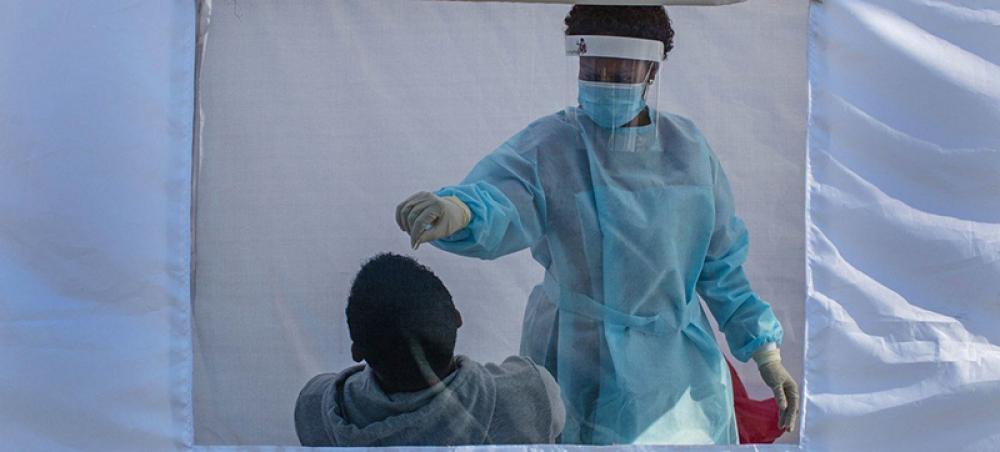Just Earth News | @justearthnews | 13 May 2022, 07:45 am Print
 North Korea COVID-19
North Korea COVID-19 Image: IMF Photo/James Oatway
New York:The World Health Organization (WHO) said on Thursday that it is committed to helping the Democratic People's Republic of Korea (DPRK), respond to COVID-19, after its first declared infection was reported in the media there.
Responding to a question from UN News, WHO said it was in touch with the authorities in DPRK but has yet to receive an official report from the country’s health ministry.
Edwin Salvador, the WHO Representative to the country, also known as North Korea, said that the UN agency had supported the country in developing its national preparedness and response plan for COVID-19.
State media saying an Omicron variant had been detected in the capital, Pyongyang.
Supportive presence
Along with its partners – including the UN Children’s Fund (UNICEF) and GAVI, the vaccine alliance – WHO has supported North Korea in developing a COVID-19 vaccine deployment plan.
The scheme was reviewed and approved by a multi-partner body at the regional level, clearing the isolated nation to receive COVID-19 inoculations through the UN-led equitable vaccine distribution initiative COVAX.
WHO remains committed to working with DPRK’s national authorities by providing them with the necessary information on COVID-19 vaccines available through COVAX.
COVID surge in Southern Africa
Meanwhile as the winter season in the region approaches, southern Africa is facing a COVID-19 upsurge for the third consecutive week, breaking a two-month decline in overall infections across the continent.
The sub-region recorded 46,271 cases last week, marking a 32 per cent increase over the week before, largely driven by a spike in South Africa, where weekly cases have quadrupled over the past 21 days.
“This uptick in cases is an early warning sign which we are closely monitoring”, Abdou Salam Gueye, WHO Director of Emergency Preparedness and Response, Regional Office for Africa, told a press conference online.
“Now is the time for countries to step up preparedness and ensure that they can mount an effective response in the event of a fresh pandemic wave”.
Sweeping the south
Despite rising cases, hospitalization in South Africa remains low, with the number of COVID-positive inpatients at around 20 per cent of the late December peak.
However, over the past three weeks, there were 376 recorded deaths – twice as many compared with the previous three.
In Gauteng and KwaZulu-Natal provinces, where the latest wave was first detected, both hospitalizations and inpatient deaths increased by 90 to 100 per cent over the past two weeks.
“With the experience gained over the past two years, we must do all it takes to curb the adverse impacts of a new pandemic wave by stepping up vaccination and the measures to detect and prevent the spread of the virus as well as treat patients,” Dr. Gueye said.
Omicron driver
Amidst relaxed public health and social measures, the current surge is being fuelled by the Omicron variant.
Since the beginning of April, South Africa recorded 1,369 cases of the Omicron sub-variant BA.2, 703 cases of sub-variant BA.4, and 222 cases of sub-variant BA.5.
However, BA.4 and BA.5 remain the most concerning because they contain the largest number of mutations, and it still unclear how they affect immunity.
Eswatini and Namibia are also seeing an increase in cases, with both currently reporting 50 per cent more over the past two weeks than the previous two.
During the week ending 8 May, Africa recorded 52,878 COVID cases – a 38 per cent rise from the week before.
“To beat this pandemic, we must stay vigilant. The harsh reality is that complacency comes at a high price,” stated the WHO official.
European deaths pass two million mark
At the same time, the WHO European Region confirmed that the death toll there has reach two million – representing only a fraction of overall fatalities directly and indirectly associated with COVID-19.
Though declining, cases in the region remain far too high, reminding that SARS-CoV-2 remains a killer virus, especially for the unvaccinated and clinically vulnerable, said the WHO office.
However, WHO maintained that with definitive steps on multiple fronts, both now and in the long term, the acute phase of the pandemic will come to an end.
These measures include continuing to protect the most vulnerable; monitor the virus and its spread; keeping health systems ready for future pandemic threats; and tackling long-term impacts, such as the looming prospect of millions with post-COVID conditions, or ‘long COVID’.
Commemorating the loss
To mark the grim milestone, WHO has provided powerful testimony from the bereaved.
“I can't put into words how much losing my dad has affected my life and my family's”, said Londoner Safiah Ngah, of her father, a doctor, who succumbed to COVID-19.
“It feels like the foundation of our lives has just been ripped apart.”
- New hybrid Mpox strain surfaces in UK and India — WHO sounds global alert
- Deadly weight: Obesity now responsible for 1 in 10 infection deaths worldwide
- Coffee and tea: This everyday drink may help protect your brain from dementia
- Happy Chocolate Day! The sweet secret behind chocolate’s hidden benefits
- Cambridge study finds menopause affects memory, mood, and sleep





-1763561110.jpg)
